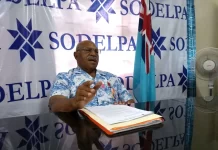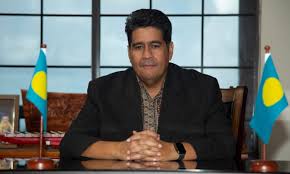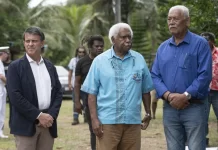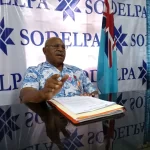-The Royal Navy’s carrier strike group would be welcome to visit Palau when it deploys to the Indo-Pacific this year, as the island attempts to counter growing Chinese intimidation.
In an interview with the Telegraph, Palau’s President Surangel Whipps said his country was facing a pressing need to shore up allies, as Beijing steps up its efforts to lay claim to territory and the energy rich waters of the Indo-Pacific.
The British carrier strike group could encounter a hostile reception from China during its deployment, as Beijing vies for economic and military dominance of the region.
“If they want to come, we’ll find a way to bring them here so they can have some shore leave and enjoy our beautiful island,” said Whipps.
His tiny island nation of 21,000 people was a key battleground between U.S and Japanese forces during the Second World War and the stage of the major Battle of Peleliu in 1944.
It is now emerging as a strategic outpost of the U.S-China great power competition in the Pacific.
Like other Pacific and Southeast Asian coastal nations, it is on the front line of China’s forceful moves as it asserts its claims to disputed reefs, islands and constructs facilities allegedly intended for military purposes.
Palau has faced Chinese opposition to its own claims to the continental shelf – a coveted spot for deep sea mining – and reported incursions by Chinese fishing fleets.
“We have had Chinese vessels come into our territory, not respect our borders, steal our resources and the response from the Chinese government has been ‘hands off’,” said Whipps.
As the most vocal China-sceptic of the Pacific leaders, he admits that Palau’s role in international efforts to counter Chinese regional hegemony “makes us a target.”
But he believes the deployment of partner country naval missions to the region, including the HMS Queen Elizabeth, the UK’s new aircraft carrier, and its accompanying battle ships, will help “promote peace and security.” He added: “We welcome the UK fleet.”
The choice of the Indo-Pacific for the maiden grand voyage of the carrier signals the growing focus of the UK and its allies on securing the patchwork of vital global trade routes that could be exploited for economic coercion.
During a visit to Indonesia this week, Dominic Raab, the Foreign Secretary, said the Indo-Pacific lay “at the heart of” British foreign and security policy.
“The Carrier Strike Group’s deployment marks the start of a new era of defence cooperation,” he added.
Although the fleet is believed to have no current plans to anchor near Palau on a voyage that focus on freedom of navigation operations in the South China Sea, the island features prominently in US defence priorities as Washington seeks to expand its own footprint.
The U.S Indo-Pacific Command in Hawaii has earmarked Palau for a US$200 million radar system to detect and track air and surface targets, as part of a new US$27.3 billion strategic regional plan.
Palau, like other nearby Pacific nations, has a 50-year defence agreement with the U.S known as the Compact of Free Association (COFA) that already grants the Pentagon virtually unrestricted military access in exchange for a security guarantee and benefits for Palauan citizens.
Whipps offered his unwavering support for the radar programme, stressing he was keen to see U.S military bases established on the island, and would also be open to ground-based – although not nuclear – missiles being stationed there as cooperation expanded.
“Whether it is our runways, or our seaports, they are available to the United States,” he said. “We definitely want to work with the United States on strengthening those facilities so that they are available and ready for use.”
The improvement of Palau’s three operational runways and deepening of port facilities to accommodate a fleet as large as a carrier strike group, could both serve strategic military purposes and make Palau’s economy less reliant on tourism, the president said.
“We continue to talk with the United States on these issues, but this is something that as a region – and all our global partners – we can look at together. The port facilities could be used by the French and the UK and Japan,” he said.
“The Palauan people are willing to do their part in promoting peace and security in the region.”
His stance will be viewed positively in Washington. Although there has been no public commitment to build new military bases in Palau, U.S forces are under Japanese pressure to shrink their massive bases in Okinawa and are looking to diversify their capabilities across the Pacific.
Situated east of the Philippines, a U.S treaty ally, Palau forms part of the “second island chain” that U.S military strategists view as a critical line of defence against Chinese advances across the Pacific.
“Palau during World War 2 was a strategic outpost for Japan and there’s a reason – you just look on a map and see our location and you know why,” said Whipps.
Palau’s importance was underscored by a visit last year by Mark Esper, the first ever U.S defence secretary to do so.
Heino Klinck, former deputy assistant secretary of defence for East Asia, who was on the trip, said the U.S strategy was focused on “places not bases” to respond to the growing Chinese military threat in the West Pacific and to complicate the People’s Liberation Army calculus.
“You complicate PLA calculus by ensuring the armed forces have flexibility in terms of the deployment locations,” he said, adding that improving Palau’s infrastructure was key to this plan.
In the face of more assertive and aggressive PLA actions, the presence of the Queen Elizabeth strike group would be significant in “ensuring that the global commons remain open to everyone,” said Klinck.
“I think writ large we value the presence of our allies and partners in the region, both from a diplomatic and messaging perspective that shows to the Chinese that this is not just a U.S-China issue, this is a China versus the world issue,” he said.
The increasing political alignment between the US and its allies in the Indo-Pacific and on issues relating to China also extends to Taiwan.
Beijing claims the democracy of 23 million as its own territory and has vowed to annex it – a move which would have huge regional security implications.
Palau is one of just 15 countries that have formal diplomatic ties with Taipei, which has exposed it to the chequebook diplomacy China has deployed across the Pacific.
Whipps said Beijing tried to buy his country’s allegiance with the promise that “the sky is the limit, just join us, cancel that relationship with Taiwan.”
He said no. “We shouldn’t be forced by anyone else to say that relationship should be severed,” he said, adding that while Palau sought friendly ties with China, “we should respect each other’s choices, we should respect each other’s borders.”
Palau suffered to the point of near extinction during the Second World War.
“We don’t want to ever have a war and we are a peaceful nation, but at the same time you have to do all you can to prevent a war,” said the president.
“Having partnership between nations provides stability and also helps in the prevention of those kinds of activities that may escalate to the point where we cannot maintain the peace and stability that we have,” he said.
SOURCE: THE TELEGRAPH/PACNEWS














